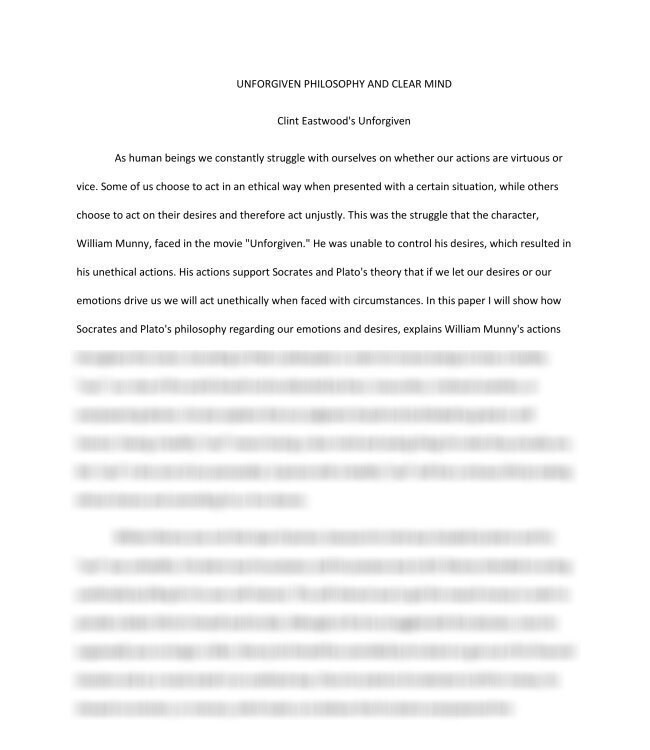UNFORGIVEN PHILOSOPHY AND CLEAR MIND As human beings we constantly struggle with ourselves on whether our actions are virtuous or vice. Some of us choose to act in an ethical way when presented with a
UNFORGIVEN PHILOSOPHY AND CLEAR MIND As human beings we constantly struggle with ourselves on whether our actions are virtuous or vice. Some of us choose to act in an ethical way when presented with a
"The "Unforgiven." "only "soul" "soul," 1992. 1996. 359d-360c. A AND According After Although Another As Bibliography Both CLEAR Clint Clint. Discovering Eastwood's Eastwood, Faced First Gyges Gyges, Gyges." Hall, Having He His However, I I. In Inc., Jersey: Like MIND Munny Munny's Munny, New Once PHILOSOPHY Philosophy. Plato Plato's Plato. Prentice Republic. Ring River, Saddle Socrates Some Studios, Supporting The This Thomas Unforgiven Unforgiven. Upper Warner When White, William a able about act acted acting action; actions actions. actually adequately against all, also amongst an and anxieties, anyone apparent appetite appetites. are are; as aspect at avenge aware away balance balanced be beat. became because becoming been before behavior." being beings believe better blinded brink but by can caught cause certain changed character, children choices choices. choose circumstances. clear clouded come committed concluding conclusion, constantly contended control control, controlled controlling core could crime death death, decision decision, decisions desire desire, desires desires, desires. did discussing distorted done drive driven due either else's emotion, emotional emotions emotions. end ethical even everyone exercising explains faced fact failed failure family fear fear, fears, feelings filled financial find finding first five flow follow for found four freedom, friend friend's from full further gave get getting god good got greed had had. has have having he health healthy help her him him. himself himself, his how human idea identity. if ill immediate implement in insecure insecurities insecurities, insecurity intended invisible involved irrational is judgment judgment. justified keeps kids. kill kill, kill. killed. killer killer, killing known. leads let life life, like live longer lost, made maintain making means men mind mind, minds money money, movie movie. murder murder, no not now now. o obtains of on one only or order others our ourselves out over overpowered overpowering own paper part person person, personality. perspective philosophy philosophy, physical plays power presented proposition prostitute. provide punishment punishment. purpose purpose, reaction receiving regarding remorse, result resulted reward reward, seeing self-control. self-interest self-interest, self-interest. should show showed shows since situation situation, six skills soul soul's soul, soul. story, struggle struggled support supports supposedly sure surpassed taking task that that, the their then theory theory, therefore these they things this three through throughout time to truly twUNFORGIVEN two type unable understood unethical unethically unhealthy unhealthy. unjust unjustly. unlike us used vengeance vice. view virtue virtuous virtuously, was way way. ways. we were what when whether which while who will with within without world would wrongdoing,
UNFORGIVEN PHILOSOPHY AND CLEAR MIND
Clint Eastwood's Unforgiven
As human beings we constantly struggle with ourselves on whether our actions are virtuous or vice. Some of us choose to act in an ethical way when presented with a certain situation, while others choose to act on their desires and therefore act unjustly. This was the struggle that the character, William Munny, faced in the movie "Unforgiven." He was unable to control his desires, which resulted in his unethical actions. His actions support Socrates and Plato's theory that if we let our desires or our emotions drive us we will act unethically when faced with circumstances. In this paper I will show how Socrates and Plato's philosophy regarding our emotions and desires, explains William Munny's actions throughout the movie. According to Plato's philosophy in order for human beings to have a healthy "soul," our view of the world should not be distorted by fears, insecurities, irrational anxieties, or
